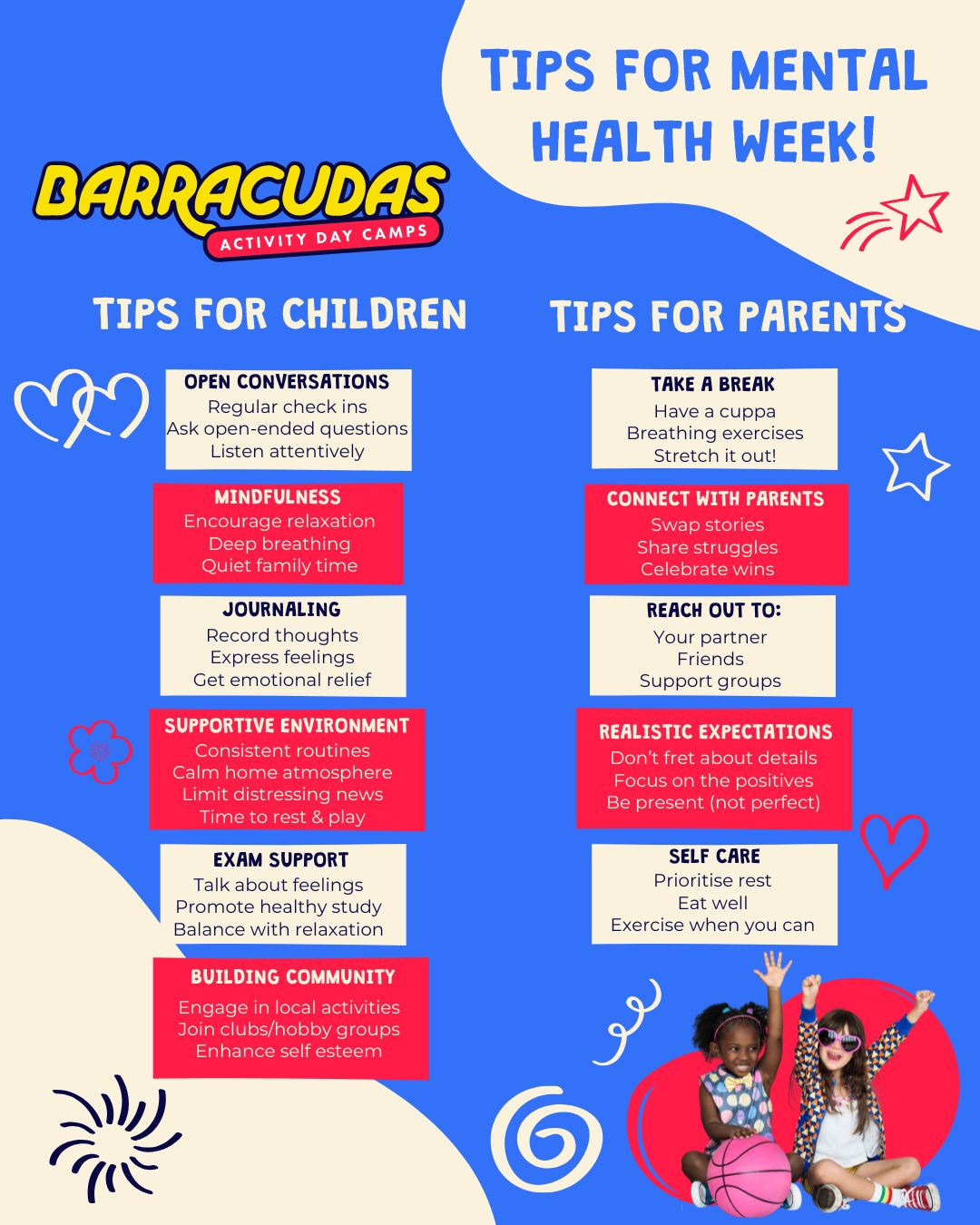12/05/2025
Supporting Your Child’s Mental Health: A Parent’s Guide for UK Mental Health Awareness Week 2025
This week (12–18 May 2025) marks Mental Health Awareness Week in the UK, with the theme “Community”—a timely reminder that none of us are in this alone. As parents, we play a pivotal role in nurturing our children's mental well-being, and it's essential to remember that support is always within reach. 💚
Tips to help your child's mental health
Foster Open Conversations
Creating a safe space for your child to express their feelings without fear of judgment is crucial. Regularly check in with them, ask open-ended questions, and listen attentively. Even if they don't open up immediately, knowing you're there makes a significant difference.
Introduce Mindfulness and Relaxation
Mindfulness activities, such as deep breathing exercises or quiet family time, can help children become more aware of their thoughts and emotions. These practices teach valuable coping techniques for managing stress and anxiety.
Encourage Journaling
For older children and teenagers, journaling can be a less intimidating way to process emotions. Encourage them to write about their thoughts and feelings, which can provide clarity and emotional relief.
Create a Supportive Environment
A consistent routine and a calm home atmosphere can provide children with a sense of security. Limiting exposure to distressing news and ensuring they have time to rest and play are also beneficial strategies.
Support During Exam Stress
Exam periods can be particularly stressful for children. Encourage them to talk about their feelings, reassure them that their worth isn't defined by grades, and promote healthy study habits balanced with relaxation.
Build a Sense of Community
Engaging with community activities or groups can provide children with a broader support network. This sense of belonging can enhance their self-esteem and resilience.
How Barracudas Boosts Children's Mental Health in the Holidays
We know the school holidays can be a challenging time for parents trying to balance work, childcare and keeping kids entertained—and it can be a time when some children feel isolated or anxious without their regular routines. That’s where Barracudas Activity Camps step in! 🎉
At Barracudas, we’re passionate about helping children thrive during the school break by offering:
- Active play: With over 80 activities to choose from, kids stay physically active, which has a huge impact on mood, confidence and stress levels
- Positive social connections: Camp is a great opportunity for children to meet new friends and strengthen social skills in a fun and relaxed setting
- Supportive staff: Our team is trained to create an encouraging environment where every child feels welcome, valued, and supported
- Freedom to be themselves: We let kids explore new activities, try fresh challenges and express themselves creatively, all of which are key to building self-esteem
We’re proud that so many parents tell us their children come away from camp happier, more confident, and excited for the next time. Whether your child is a sports enthusiast, loves to get creative or just wants to have fun with friends, there’s something for everyone at Barracudas!
Taking Care of You: Mental Health Tips for Parents
As much as we focus on supporting our children’s mental health, it’s just as important to take care of our own well-being. Parenting is rewarding—but let’s be honest, it’s also exhausting, emotional and overwhelming at times. And that’s okay. 🌸
Here are some gentle tips to help you look after yourself:
- 🧘♀️ Take short breaks (without guilt): Even 5–10 minutes to sit with a cup of tea, do a breathing exercise, or stretch can make a big difference. Resting isn’t lazy—it’s essential
- 🤝 Connect with other parents: Chatting with fellow parents, either online or in person, can help you feel less alone. Swap stories, share struggles, and celebrate wins together
- 🎯 Set realistic expectations: It’s okay if the laundry piles up or dinner isn’t Insta-worthy. You don’t have to be perfect—just present
- 💬 Ask for help: Whether it’s leaning on your partner, friends or reaching out to professional support, there’s strength in knowing when to say “I need a hand.”
- 😴 Sleep and eat well (when you can): This one’s tough with busy family life, but try to prioritise rest and nourishing meals. Your body and mind will thank you.
Taking care of yourself isn’t just good for you—it sets a powerful example for your children. Let them see that emotions are natural, support is healthy, and self-care is strength.


Support Resources for Parents
If you're concerned about your child's mental health, several organizations offer guidance and support:
- YoungMinds: Provides resources and a Parents Helpline for advice on supporting your child's mental health.
- NSPCC: Offers expert support and advice for various parenting challenges.
- Mind: Information on parenting and mental health, including tips for everyday living.
- Charlie Waller Trust: Practical tips for parents supporting children with mental health difficulties. charliewaller.org
- NHS: Advice and information for parents concerned about their teenager's mental health. nhs.uk
Support Networks for Parents
If you're feeling overwhelmed or low, you're not alone—and help is available:
- ParentTalk (by Action for Children) – Free online support for parents from qualified parenting coaches
- Mind – For Parents – Support, self-care tips and helplines for parents with mental health concerns.
- Family Lives – Offers a helpline and online forums for any parenting challenges or emotional struggles.
- Samaritans – Free, confidential emotional support, 24/7.
- The DadPad (for new dads) – Mental health support and parenting advice tailored to fathers.

